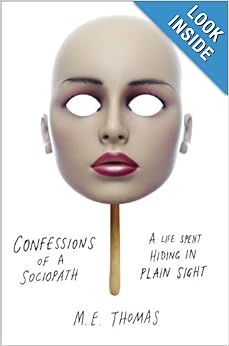Books, movies, food, and random thoughts in English and Chinese. Sometimes I confuse myself.
Search This Blog
Monday, September 23, 2013
Confessions of a Sociopath
Borrowed the book from the library and just began reading it. The author does sound like a genuine case of antisocial personality disorder (ASPD, also known as psychopathy, which the author prefers to call sociopathy because it doesn't make her sound like a "psycho"), but she is highly functional and smart enough to not commit any crime (at least not enough to get caught).
It is a bit amusing to read her repeated declaration, plus citing a few other fellow ASPD individuals' declarations, that they believe not having empathy is better than having it, because they are invulnerable to various irrational emotions such as guilt, shame, anxiety, or low self-esteem. I am not saying they are wrong. I just find it funny because, by definition and by all account, having empathy and not having empathy are essentially two incompatible states of existence. If you don't have empathy, you can't know what it's like to have it, and vice versa. I don't claim that life is better with empathy than without, because I can't possibly know what it's like to have ASPD. It's like, I can't claim it's better to be a woman than to be a man, because I can never know what it's like to be a man. Without first-hand knowledge it is impossible to compare. It's pointless to claim one "prefers" a life with or without empathy because it is even less of a choice than being homosexual or heterosexual.
There are some other curious "confessions" in the book as well, although I've only gotten through the first 80 pages. For example, she claims she does not empathize with people's emotions. Don't know. Don't care. But in her chapter on a fairly unhappy childhood (although she was not grossly abused or neglected by my Chinese standard) she wrote paragraph after paragraph speculating her mother's state of mind as a narcissistic aspiring actress. She presents it as "facts," of course, but it's clearly her concerted effort to make sense of her mother's mind. She also writes a rather short but heart-breaking section about her fragile older brother Jim that seems to suggest some sympathy.
Another declaration she makes repeatedly, for which I do not doubt her sincerity, is that she is fine. FINE. Great. Please don't worry or be afraid of her. She's not a monster or a criminal. Rather, she is an upstanding member of the community and goes to church regularly and teaches Sunday school and is gainfully employed and has close friends and family. I'm totally fine with that. I believe her. She sounds like a perfectly rational person ... most of the time. And then she describes her reckless, impulsive, thrill-seeking tendencies, such as choosing to live in the worst neighborhood in town and getting repeatedly broken into, driving with wild disregard for her own and others' safety, and her inability to be deterred by awful consequences. Plus she describes with vivid details an incident in which she was so angry at a trivial confrontation with a stranger where she fantasized killing him and then casually mentions that similar reactions have occurred multiple times. Well, I do hope her cold, calculating, unemotional, and self-beneficial urges keep a lid on the murderous impulses. Perhaps she gets enough release from being a lawyer and therefore never needs to resort to killing someone.
Overall I quite enjoy her candor and wish more people without ASPD would more openly and freely discuss their "dark sides" with such ease. We all have plenty of dark sides. I don't feel at all superior to her. I guess that won't happen any time soon as people without ASPD are more or less stopped by all those annoying emotions like shame, guilt, and embarrassment.
Subscribe to:
Post Comments (Atom)
The Ending of Le Samourai (1967), Explained
A quick online search after watching Jean-Pierre Melville's Le Samourai confirmed my suspicion: The plot is very rarely understood by E...


2 comments:
Ha I was just listening to the new Breaking Bad podcast in which Vince Gilligan mentioned a book that's likely to be this one!! If you watch the show he was talking about the character Todd aka "Opie dead eyed piece of shit". Also, your last post reminded me of an Alice Munro story "Axis", nothing to do with the plot but rather the construction of time and space of the narrative.
Thanks for the recommendation. I'll look for the Alice Munro story.
I don't watch Breaking Bad. It seems too much of a commitment to watch all those seasons from the start...
Post a Comment